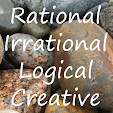Another reader ended his comment by saying:
Apologies for the simple rhetorical arguments, but frankly, map skills–though indeed fundamental–met their obsolescence some time ago with the marketing of affordable and clearly labeled globes.I in turn responded with this comment:
I don’t know about you, but I’m getting really tired of the argument that people no longer need to actually learn anything, because all information is now so readily available. It is just a crutch, in my opinion. Should elementary schools stop teaching addition and multiplication because calculators are readily available? Should we not teach spelling because of dictionaries and spell-check?The commenter in question then decided to continue the conversation in a comment to this post here at Irrational Woman. Since the comment was really only tangentially related to that post, I thought I would address the issue in depth in a post of its own. So here goes.
I wish these people would give it a rest already!
My comments about calculator and spell check were to some extent hyperbole, but they do have some relevance. The reference to spell check in particular. I'm not a good speller and I am overjoyed to have access to spell check, and a dictionary for that matter, on a regular basis. But you have to know at least generally how to spell the word before either resource can be of any assistance to you. I have been know to misspell words so badly that even spell check had no idea what I was talking about. This is relevant to the map question because if you don't have at least some idea where Iraq is, you won't even know what area of the globe to look on. Some knowledge is necessary before references can be used effectively.
In addition, my comment was not only directed at Jimmy's comment. Previously on Poliblog a reader had made a comment about the ready availability of information devaluing the study of history:
Now it’s too easy to find lots of stuff available about any historical subject. If I chose to, I could know more about the Christian Emperors of Constantinople than 99% of the population with only a single day’s study.These kinds of statements irritate me. It is like saying education doesn't matter anymore. Or that the subjects that I have spent many long years studying and attempting to understand in depth can be mastered in a day. It just is not the same. The readily available information does not always tell the whole story or in some cases may not even be accurate. In the case of maps, they are probably accurate, but it was the overall attitude I was objecting to as much as anything else.
And just for the record, I did use spell check during the writing of this post, and will use it again many times in the future.


2 comments:
As a person who works in a technical field and uses math frequently I can tell you that you hit the nail on the head with the calculator analogy.
I have worked with some really smart "greybeards" who were involved in the Apollo program. These guys grew up without calculators and computers. Their best tool was a slide rule and they knew their math stone cold. As a result of years of manually crunching numbers they could solve complex math problems on the spot in meetings while me and others of my generation would either sit with a blank stare or fumble about for a calculator (and I consider myself to be very mathematically knowledgeable). Their rote memorization ingrained in them a fundamental understanding of the relationships numbers and equations that can’t be acquired with electric crutches.
Not many engineers under 35 or 40 have such strong math skills. I did work with a young engineer once who refused to use a calculator. He would take a notebook and pencil with him everywhere - not terribly convenient, but he was a whiz.
Thanks Brian. I'm glad to know that I'm not the only one that feels that way.
Post a Comment